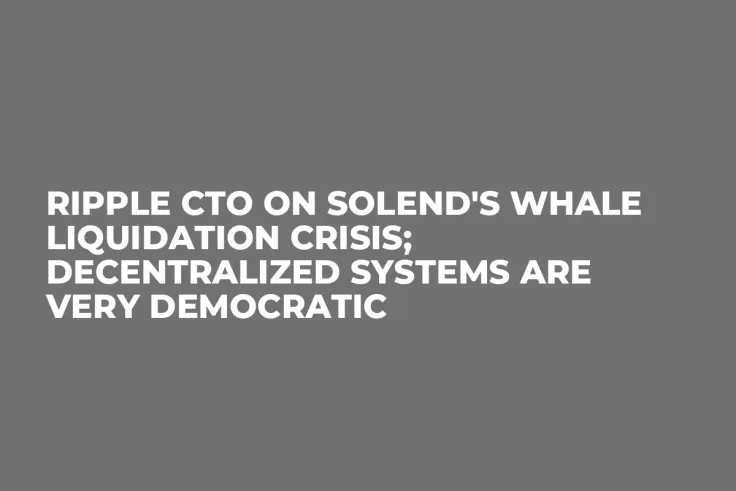
Disclaimer: The opinions expressed by our writers are their own and do not represent the views of U.Today. The financial and market information provided on U.Today is intended for informational purposes only. U.Today is not liable for any financial losses incurred while trading cryptocurrencies. Conduct your own research by contacting financial experts before making any investment decisions. We believe that all content is accurate as of the date of publication, but certain offers mentioned may no longer be available.
Ripple CTO David Schwartz, in response to tweets regarding the Solend liquidation crisis, believes that "decentralized systems are very democratic."
If you can convince the community to make rules changes, you can change the code in any way they'll accept. Nothing is set in stone -- decentralized systems are very democratic because there's no way to force the majority to accept anything they won't agree to.
— 𝙳𝚊𝚟𝚒𝚍 𝚂𝚌𝚑𝚠𝚊𝚛𝚝𝚣 (@JoelKatz) June 19, 2022
At the heart of Solana's DeFi protocol, Solend is an anonymous wallet that had deposited 95% of Solend’s entire SOL pool and represented 88% of USDC borrows. With SOL's plummeting price, the wallet reportedly used by Solend's single largest user came dangerously close to a hefty margin call. If SOL reaches $22.30, the protocol will liquidate up to 20% of the whale's collateral automatically.
Solana protocol engineers were concerned that multi-million dollar liquidations might overwhelm Solana's decentralized exchanges, causing the network to stutter. They managed to get a vote passed to take control of the whale wallet and liquidate it more smoothly via OTC.
Following a significant backlash, Solana DeFi protocol Solend is holding a quick vote to determine whether the previous action to temporarily take control of the platform's largest account, a $100+ million whale on the cusp of a possibly disastrous on-chain liquidation, should be invalidated.
Ripple's XRP escrows explained
Ripple locked 55 billion XRP (55% of the total potential supply) into a series of escrows to provide more predictability to the XRP supply. The release of XRP is controlled by these escrows on the ledger and the ledger mechanics, which are enforced by consensus.
The escrow is made up of independent on-ledger escrows that each month release a total of one billion XRP, putting a cap on the amount of new XRP that can be brought into circulation.
SBI considers the use of XRP's ODL in its business model
Mr. Kitao of SBI gave an investor presentation today in Nagoya. On page 164 of 187 pages, it's stated, #XRP ODL will be examined for utilization in the SBI Motor Africa business model when @Ripple's U.S. trial has ended in desired results. pic.twitter.com/4gH0p2Do5A
— ☀🌸Crypto Eri 200k Followers (beware of imposters) (@sentosumosaba) June 20, 2022
As reported by @sentosumosaba, Japanese used car exporting company SBI is considering the use of XRP's ODL in SBI Motor Africa's business model upon a favorable conclusion of the XRP lawsuit.
As previously covered by U.Today, SBI Motor Japan announced in May that it is now accepting XRP and Bitcoin as payment options.
 Vladislav Sopov
Vladislav Sopov Dan Burgin
Dan Burgin